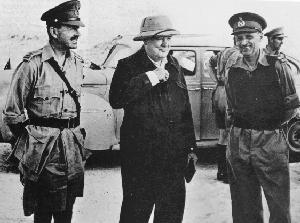The North African Campaign Of World War II


High Command Disputes and Interference
“In London meanwhile, the Prime Minister was getting more and more
irritated at General Auchinlecks reluctance to launch an offensive1
Both Hitler and Churchill had a tendency to interfere in the
conflict in North
Africa and they both regularly insisted on offensive action to satisfy broader
political and strategic aims. Problems arose when these leaders became obsessed
with the need for offensive action whilst not analysing the situation in North
Africa itself. Churchill grew increasingly impatient with his commanders and
Wavell and Auchinleck were casualties of this impatience, when they refused to
go on the offensive for the simple reason that they would lose against a
numerically and technologically superior enemy.
“Churchill desperatel needed
a victory, both for political and morale reasons2, but
these were no
grounds to sacrifice the Eighth army and even Montgomery received the same
pressure when as usual, Churchill pressed for an immediate resumption of
offensive operations, but Montgomery refused to be
rushed. After the Torch
landings in North Africa on the 8th November 1942, there was confusion and
disagreement as to who was in command of the French forces and who was to
be in overall command. This slowed the progress of the landed troops , but
cannot be said to have been decisive, but for Rommels Afrika Korps Hitlers
interference was just this.
Hitlers interest was fitful in any other theatre than the Russian
and until he was about to lose North Africa he treated it as a sideshow, never
grasping its place in the total pattern of the war, as Churchill did
even when Britains fortunes were at their lowest point, in
19403.
Rommel`s tactical withdrawl in late 1942 was constantly hampered by Hitler`s
insistance on standing and fighting the numerically superior Eighth Army,
infact “Hitler was so fully engaged with the worsening situation in Russia
that he was completely out of touch with the situation in
Tunisia4 When in
late 1942 the ‘Desert Fox’ told Hitler that a delaying attack
upon the advancing
Eighth Army would be futile and counter-productive a signal came
straight back...that Rommels proposals were over-ruled5,
which was why Rommel then decided, probably against his better judgment
6 to stand and fight
the Eighth Army. It should be stressed that the fact that Hitler was so
pre-occupied with the Eastern front led to the mis-informed orders that were
to cost Rommel his armour, aswell as his last
chance to regroup and conduct an
organised and effective counter-offensive against Montgomery and his Eighth Army.
Therefore it can be argued with confidence that Hitlers interference in
Rommels operations was a significant factor in contributing to the Allied
victories in late 1942, rather than being faced by an organised counter attack
by Rommel around the defensive position of Mersa Matruh which without doubt
would have been far more effective and obviously to Rommels advantage.
1 Peter Young, Purnells Encyclopedias Of The Second World War (Volume 3, page 871)
2 F.W Winterbotham, The Ultra Secret page 72
3 Alan Bullock, Hitler and Stalin - Parallel Lives (page 854)
4 F.W Winterbotham, The Ultra Secret page 101
5 F.W Winterbotham, The Ultra Secret page 101
6 F.W Winterbotham, The Ultra Secret page 97
Supplies
Diverted and Committed Troops
Intelligence in North Africa
Weapons In North Africa
Commanders and their tactics
Concluding thoughts on the North African Campaign
Back to the Start
Mail Me


